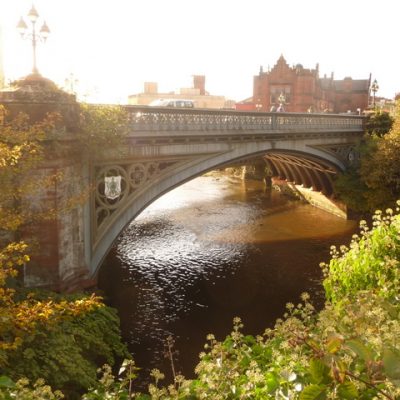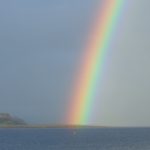A short story by Shirley Gillan
Support independent, non-corporate media.
Donate here!

His boss had made a big deal about the shortest day being over and how they were now heading for the light and before they knew it it’d be all daffodils and birdsong, but it was still freezing and dark. Heavy clouds bumping his head. Raining hats and clogs … bats and frogs – no. Cats and dogs. What was that other word – driech? The locals always had just the right sounding words. At home he’d hated the heat: 40 degrees of shimmering discomfort, with no chance of a breeze, not from wind or fan. But now he longed for it, from the tips of his wet, icy fingers, to the tips of his frozen, soggy toes. In fact – could he even feel his toes? Could he have frostbite? His heart joined his feet as a taxi pulled in. They had a special deal with RiverRides and boy did those drivers abuse it. They’d sit in the warmth of the office, puffing illicitly and blethering with the big man while he cleared up the mess of a drunken night and brought a sheen to the names carefully inked across the back of the cab: Jimmy! Margaret! Bob! – look at us! We’re successful and own a taxi which brings us lots of money. You, on the other hand, are just a moving mop, hired at our pleasure and so beneath us we don’t even know your name. In fact, you look foreign, should you even be working? Are you taking this job from one of ours? Should you even be here?
But ultimately the Jimmys and Margarets, even the Sunjitas and Guptas, knew that their fellow countryfolks would not do this work for this price and so they’d just smirk as they settled in their newly scented, no-trace-of-vomit cars and pull away. No tip.
‘Homeland!’ The big man peered round the office door. ‘You take this one.’ Navid nodded his assent and attempted to smile through the clenching in his gut. An Iraqi with a Persian name: a rare, but not precious, thing. He had no idea how his mother had persuaded his father to give their first born an Iranian name, but it caused him no end of trouble in school playgrounds. The animosity between the countries was ingrained, as far as he could see, like that between the Scots and English. When he’d come home from school crying and demanding to know why he’d been inflicted with such a name, his mother had assured him that it meant reward and that it was surely prophetic. He’d found out in his teens it also meant judgement, and began to realise it was that which had been prophetic.
It was the one thing he thought he could happily leave behind when he came to Scotland – surely no one would know the difference? And they didn’t. Somehow even his own people didn’t seem to find it a big deal – everyone here had far bigger deals to deal with. Ironically it was the locals, with their love of Homeland, who’d clocked his namesake in the series and decided it would be a fitting nickname for him.
A bald guy heaved himself out the cab with a grunt and waddled towards the office, adjusting his gut in his belt. Navid grabbed the hose and released the water. When he’d first been offered the chance to work here, he’d immediately said yes, driven just about mad with poverty and boredom. Cleaning cars? There were worse jobs. And he was surrounded by guys just like himself, outcasts of the system unable to get back into their own. There was good banter, Kurdish, Arabic and Farsi flung about with the sprays of water, spattered with determined efforts at English.
His first day, Sherwan and Ali had shown him what to do. His second day, Sherwan had misjudged the force of his hose and water had poured down Navid’s head and face. It took his breath away but also his legs – he’d crumpled, puddled water soaking into him as he curled up on the tarmac, hyperventilating. He couldn’t move. He was tied to a table, a rope tight around his chest, arms and legs pinioned by four men, while a fifth poured water in a steady, never ending stream over his face and down his throat. He was gasping, struggling. But he couldn’t shift at all. There was no breath in him, only water. Water in his lungs, water above him, water beneath him: he was submerged. He was going to die.
‘Navid, Navid…?’ Sherwan and Ali were shaking him and pulling him to his feet, faces drawn between concern and bemusement. ‘What’s up, bro?’ He’d heard Ali’s voice through the haze, sensation returning to his legs and embarrassment creeping in to replace terror as he realised where he was.
That was six months ago. He’d batted away their questions, saying the cold had given him a shock, and since then had mostly managed to keep himself in control, reciting, ‘I am in Glasgow, I am safe,’ over and over like a soothing blanket whenever he felt the bubbling fear of water in his face.
He soon had the taxi sorted and his boss came out with the driver, each crushing cigarette ends underfoot as they approached the cab. The big man glanced at it approvingly, handed Navid some coins and told him to bugger off till tomorrow. Navid nodded and shoved the money in his back pocket, not bothering to count it. Working under the radar meant no chance of complaining and his boss didn’t do too badly by him. He had friends who’d worked for a week on a construction site only to be told at the end of it there was no money to pay them.
Any warm fuzzy feelings about his boss evaporated as soon as he turned the corner and felt the full force of the wind on his already chilled body. The big man didn’t do too badly from them either – who else would keep turning up, week after week, facing horizontal rain and hypothermia for less than a tenner a day?
All he could think about was dry socks and hot tea. He tried to remember the flicker of an uncertain smile and what that might mean, but the image evaporated as the rain smarted his cheeks and hope sprung away.
He still couldn’t feel his toes and his heels were rubbing in his sodden socks. He shoved his hands in his pockets and shrunk himself into his hood, longing to escape the drenching. He attempted a ragged run down the last few streets, cursed as the key jammed in the lock yet again and started peeling his jacket off as soon as he got in the hall. The flat was quiet; maybe he’d timed it right and could get a moment to himself. He shoved the bedroom door open with his shoulder and turned on the light. There were groans and mutterings of, ‘Turn the damn thing off’. Each of the four beds had someone in it, the glow of a two bar fire casting ghostly shadows on the haggard faces angled towards it, each sinking back into a deadened sleep as soon as he switched off the light. They wouldn’t be up for at least three hours; the early dark meant he’d miscalculated the time.
It felt like midnight already and he was longing to curl up in warmth. He grabbed some dry clothes from his bag under a bed and retreated to the bathroom, where he yanked off his tee-shirt, trousers and socks, hopping as the icy lino shocked his numb feet. He couldn’t face a shower. The bathroom was freezing, the water would be lukewarm and he was wet enough. He dried his hair and feet on a musty towel, pulled on crumpled socks, massaged his toes briefly, rammed himself into dry trousers and sweatshirt and moved to the kitchen.
When he had a cup of steaming sweet tea before him he pulled out the coins from his damp trousers. His rent was due next week, he’d finished all his rice and his phone would need a top up soon. The light strip buzzed and flickered, illuminating walls of peeling paint and brown damp. More cheap lino curled in rank corners and did nothing to provide a barrier from the cold dank concrete underneath. He couldn’t sit here waiting on someone to wake up so he could sleep.
His socks were soon damp in the wet shoes. He headed towards the city, pausing on the bridge. The water was swollen, banks buried in earthy movement, tree shadows ominous in orange lamplight. A lone duck paddled furiously and Navid reached into his jacket for the bread he’d shoved there at lunchtime – another break interrupted. He pulled it out, tore it in two, flung half towards the duck and began to eat the other half. The duck grabbed the offering quickly and was carried downstream and out of sight. Tears pricked Navid’s eyes. He’d wanted to share his meal but his companion had gobbled and gone. He leaned on the bridge, the chill of rusty metal piercing his sleeves. At home he’d fought his brothers for the biggest pieces of lamb, glistening meat buried in piles of saffron rice, all washed down with fragrant tea. No one ate alone. No one carried a solitary sandwich for a solitary meal. No one longed to eat with a duck.
He thought about throwing himself after the duck into the dark water. That would be ironic. No, if he was going to die, he’d at least want his breath to come to a natural stop, his lungs deflated but dry. He shook his head, letting the thoughts disperse, wiped crumbs from his face with the back of his hand and turned towards town.
It was Wednesday. She had been there on a Wednesday. If he didn’t go now, he would never go. He could buy a coffee instead of rice and if she wasn’t there, well … every sun must set. His resolve got firmer as his feet got wetter, his head already in conversation with the girl he’d seen three weeks ago and been too scared to let himself think about since. He’d been to Riverside Cafe once, invited by a guy whose car he regularly cleaned who’d wanted to know his ‘story’. Navid hadn’t wanted to tell his ‘story’, at least not in the detailed way the guy had, inexplicably, wanted, and the guy had become annoyed and stormed off.
Navid had squirmed in embarrassment and was about to bolt out the door when a girl had tumbled in, looked nervously around and plonked herself on a couch near his. He hadn’t been able to take his eyes off her. She had a halo of red curls and flushed cheeks; warm patches on chilled skin. Sherwan, in one of his many carwash sermons, had professed there were so many red heads in Scotland because the pale skin that went with it was best for absorbing the limited vitamin D that there was and therefore they, with their olive skin, were all doomed; but Navid’s only thought was that he wanted to lean his head into that fire and never leave.
He’d felt awkward sitting alone, but noticed that most people were, in fact, alone; heads buried in books or phones. At home, coffee shops were gathering places, the hubbub of chatter rising with the smoke of the shisha, conversations weaving between tables, oiled by cardamom coffee in tiny tinkling cups and sweetened by scented baklava.
He’d grabbed a paper and continued to glance at her over its pages. He’d felt he should order another drink, but had no money and knew he wouldn’t be able to swallow anyway; all his emotions were jammed in his throat. When she’d gathered up her scarf and coat she’d caught his eye. He’d thought he saw a smile, and smiled back, but she’d blushed and looked away.
His steps began to falter. Had she smiled? What was he doing? He was mad, going to a coffee shop where no one talked to anyone and he had no spare money to see a girl who probably wouldn’t be there and if she was – what would he do anyway?
But his feet had propelled him through the door and he was in the middle of the cafe before he knew it. He looked to where she had been sitting. To where she was sitting. To where she was, really, smiling at him. He walked over and sat opposite her.
‘Assalam aleikum,’ she said, as if it was the most natural thing in the world.
‘Wa aleikum salaam.’
Warmth spread through him. He could feel his toes again.









